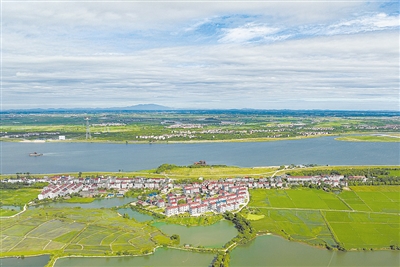
 Academic Journey to Roof of the World
Academic Journey to Roof of the World Global Community Thumbs up for China's Rural Revitalization
Global Community Thumbs up for China's Rural Revitalization 2022 CIFTIS Stimulates Greener Future
2022 CIFTIS Stimulates Greener Future New CCUS Project to Cut CO_2 Emissions by 1 Mln Tons
New CCUS Project to Cut CO_2 Emissions by 1 Mln Tons Sci-tech Support Improves Public Health Service
Sci-tech Support Improves Public Health Service BRI Project Promotes Industrial Upgrade in Indonesia
BRI Project Promotes Industrial Upgrade in Indonesia WEEKLY REVIEW
WEEKLY REVIEW China Makes Historic Progress in Solar Exploration
China Makes Historic Progress in Solar Exploration WECHAT ACCOUNT
WECHAT ACCOUNT E-PAPER
E-PAPER
 |
| Aerial photo shows the scenery of the Shikou village, Xin'gan county, China's Jiangxi province. (PHOTO: VCG) |
A complete victory in the fight against poverty has been achieved by China. All of the country's 98.88 million rural poor, as well as the 832 counties and 128,000 villages classified as poor, had been poverty free by the end of 2020. The per capita disposable income of rural residents in the first half of 2022 was 9,787 RMB, an increase of 4.2 percent, according to officials from the Ministry of Agriculture and Rural Affairs (MARA).
The pace of China's revitalization has attracted the attention of the global community and provided developmental experience to many countries around the world.
Development tales
A year after China declared victory in ending extreme poverty, rural and agricultural areas have been the main beneficiaries of the revitalization strategy, said Spain's Agencia EFE.
The agency reported a story about a small village in central Hunan province seeking to be an example of rural revitalization projects. "We began to rehabilitate the area last year," said Li Guocheng, a local farmer, adding that the direct sale of harvested local products that are marketed via QR codes without middlemen has been a great success.
The strategy provides more channels for farmers to find jobs and increase their incomes. The Wall Street Journal said that China's rural revitalization in recent years has created new opportunities for farmers, helping those who used to work in cities earn a living closer to their hometowns.
MARA's data showed that in 2020, the total number of migrant workers in China has dropped for the first time in a decade, with a decrease of more than five million.
At the same time, the rural revitalization strategy aims to promote the sustainable development of the countryside, including creating a robust rural economy, noted The Diplomat, saying it intersects with some of China's other significant aims, such as the "Chinese Dream," "ecological civilization," and "Beautiful China."
Digitalization invigorates revitalization
Development of the digital economy has accelerated the pace of rural revitalization.
EFE said while the attraction of ancestral traditions and customs drives many tourists to travel to remote villages across China, what is really making a difference is online business.
As part of alleviating poverty projects in rural areas, online businesses enables ethnic minorities to sell artisanal crafts and agricultural products to people across the country.
"We have gone from having zero yuan in rice sales in 2011 to 1.13 million (163,930 euros) in 2021," Gu Li, a local resident in Hequn villilage of Hunan who sold his rice on e-commerce platform Taobao, told EFE.
According to the website World Economic Forum (WEF), the mobile Internet creates jobs in rural areas, turning farmers into online vendors.
"Most importantly, the mobile economy turned China into an innovation hub for the Fourth Industrial Revolution," said the WEF.
Chinese contribution to global revitalization
China's achievements in promoting rural economic development and urban-rural integration have provided valuable experience for developing countries.
Former chairman of the Spanish Communist Party, Jose Luis Centella has visited China many times and witnessed the rapid changes in China's rural areas. He believed that China's success in solving the problem of absolute poverty is one of the greatest achievements in human history, and has made important contributions to global poverty reduction.
Science and technology are fully exploited by China to help its poverty alleviation efforts, which has increased income for huge numbers of farmers, said South Africa's news website Independent Online, adding that the remarkable achievements and experience are lessons for South Africa.
Technology-led poverty reduction has been advanced in China. By improving soil and introducing new varieties with techniques, Panam, a county situated 4,000 meters southwest of China's Xizang Autonomous Region, was officially removed from the poverty list in 2018 and become home to more than 10,000 greenhouses, which now generate annual revenue of 200 million RMB.
Effitt Jacobsen, a Dutch agricultural expert, said China's achievements in promoting rural economic development and urban-rural integration have provided valuable experience for developing countries.

 Next
Next



